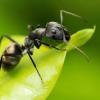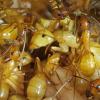I made the "snowflake" comment to find the snowflakes...and boy did it work. I smelled ya'. Your dogma is blinding your ability to scientifically utilize logic in your thinking if you call honey bees "money bees". You are already tainted to lean in only one direction, and that's a shame and certainly not scientific. There are several things that I and others have pointed out that have gone unanswered by the "anti-bee-ers", if you will. Namely, our global agricultural system is dependent on Apis mellifera ssp...that is inarguable. The human population as a whole would not collapse if we diminished the A. mellifera range back to its original lands, that is true. But many people would actually die because of it if we did it without implementing some other plan for pollination (chiefly the poor and those in under/undeveloped countries). Honey bees and their pollination abilities (which are more efficient than most people give them credit for...we wouldn't call a Corvette slow except maybe when we compare it to a Ferrari, right?) are what help to keep our food costs low...this is also a fact that can not really be argued against. There have actually been incredible studies done to show that a combination of mason bees and honey bees more effectively pollinate almonds that either of the two species alone. This should not be a surprise because nature seems to like and function best with diversity... However, when we are talking about big agriculture (and we are) we aren't really talking about diversity anymore. It's all about monocrops, unfortunately.
There are many points I saw while reading through this hot thread that I wanted to bullet and respond to separately...but I'm a combination of busy and lazy. These sorts of arguments are taxing to a logical mind, and I have promised myself to work on personal stress levels. So I didn't make a list, sorry. In regards to the efficiency of honey bees to pollinate: honey bees have scopa (hairs) on their hind legs that take a special form called the corbiculae. The laymans' term for this structure is "pollen basket". True bumble bees (bees in the genus "Bombus") also have corbiculae on their hind legs. These structures are made to hold the pollen that is collected in place precisely so that as many of the pollen grains as possible make it back to the colony to feed developing brood. Honey bees and bumblebees are some of the most-efficient pollen collectors Mother Nature has to offer...and because of this, they do not shed as much pollen flower-to-flower as some of the other pollinators with normal scopa (normal scopa make a bee's legs look like pipe-cleaners). It is also true that honey bees do not assist antheral dehiscence through sonication like other bees (mostly Bombus genus) can do such as in the cases of tomatoes and blueberries... But so what? We don't yet know how to get those bees to fit into our current model of agriculture like we can with the honey bees. People are working on it, though, and I hope it works out. When people find out I keep honey bees they ask me about dwindling numbers, it never fails. I ALWAYS turn the talk to native species and encourage them to plant native angiosperms (I typically recommend shrubby-type perennials or trees, if the person is willing) to support our struggling natives.
Another question that I asked the anti-bee-ers is this, why were our native pollinators so much better off in the past when the United States had had millions more commercially kept honey bee colonies? If eliminating the honey bee would help our natives so much, how does it make sense that they were doing better in times when commercially kept honey bees were almost double what they are in modern times?
https://www.research...1_43014730 I'm sorry, but the "I hate beez! Beez are corporayshuns, argh!" argument just doesn't stand the test of reason.
Anyway, for those against the bees, why not keep a couple of colonies yourselves, first. Do that for a year or two, and THEN come to the table of arguments and experience some true validity, how 'bout it? One more thing: beekeeping is NOT easy.
In case that link doesn't work: Google "bee colony numbers usa" one of the first links shows a graph and says "The number of managed honey bee colonies (in millions) in United..." Click that. That was research done by Dr. Keith Delaplane of UGA. The same guy that signed my Beekeeping Certificate in the UGA/Young Harris College Master Beekeeping Program and then signed my Journeyman Beekeeper Certificate the third year in the program (harder than the EAS program...). For the beeks here in the East...I highly recommend attending the Young Harris Beekeeping Conference in May of every year. The turnout is great, and the three day conference is packed with speakers on the cutting edge of bee research from all over the globe.
Edited by Nylanderiavividula, May 21 2019 - 10:06 AM.

















